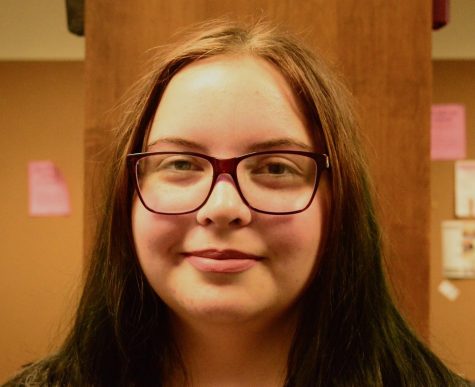Student-produced play puts mental illness in spotlight
April 30, 2017
In early April, the School of Theatre and Dance hosted a three-day festival that showcased completely student-run productions, covering a range of subjects. The festival featured four plays. The first three included everything from musicals to comedies — it even had a small one-act play about Christopher Walken.
With three performances aimed at entertaining and humoring audiences, one would hardly expect the final play to be about a serious issue that many Americans deal with today: post-traumatic stress disorder.
The play, titled “Tomorrow is a Lovely Day,” was written by Ashley Lamatrice, a junior communication studies major, when she was still in high school. The disorder was something she took special interest in.
“I was a psychology major at one point,” Lamatrice said. “Veterans with PTSD was one of the things I wanted to focus on, so I did a ton of research on the subject.”
The story centers on a World War II veteran returning home from Europe, trying to acclimate back into society while also having to deal with a looming threat of a mob war between his family and another.
“I wanted to base the play after World War II because that generation was considered the ‘greatest generation’,” Lamatrice said. “We sort of lose, in translation, the issues a lot of these soldiers that came back faced. I wanted to set it in a time period where (PTSD) wasn’t well known.”
PTSD is a disorder caused when someone goes through a traumatic experience, most commonly found in soldiers returning home from a tour in the army. Wounded Warrior Homes estimates that 540,000 veterans have been diagnosed with PTSD.
But soldiers aren’t the only ones prone to getting the mental illness. According to PTSD United, approximately 44.7 million people have or are dealing with PTSD, and women are twice as likely to develop it than men.
“A lot of people have misconceptions about what PTSD is,” said Eden Jackson (NOTE: In directory he is Matthew Boni, but told reporter he goes by Eden Jackson and others vouched for this… also said switched his major to theatre, but directory still says fashion merchandising.), a freshman theatre studies major who played Victor, the main character of the play. “I thought I had an idea of what it was going into the rehearsals for the play until I started digging deeper into my character and realized what I thought was wrong too.”
Lamatrice feels there is a stigma around the subject that keeps people from facing it head-on.
“It’s almost like a ghost illness, some people still don’t know that it exists. A lot of veterans still don’t know they have it,” Lamatrice said. “In this newer age of talking about mental health, I don’t think we talk a lot about PTSD and it’s a difficult and scary thing to go through alone.”
The play sets out from start to finish to raise awareness about a disorder; however, Lamatrice and the cast want to not only talk about PTSD, but about mental illness as a whole.
“People take it lightly and treat it as a joke,” said Talia Rockland, a freshman theatre studies major who played Yvette, the other main character of the play. “We often desensitize mental illnesses until they aren’t personal to us anymore and because of that, we end up afraid of people who have disorders instead of understanding them.”
Even though the play has finished its run and the curtains have closed, the cast still wants the conversation to continue.
“I suffer from depression,” Jackson said. “What I want people to know about mental illness is if you have someone you love suffering from it, is to just do your research. Try to listen, don’t try to cure. If we just listened more instead of trying to skip over this uncomfortable topic, we would be able to better handle these issues.”
Editor’s note: This story is part of a student media project entitled “The Silent Struggle.” See the whole project here.
Alex Kamczyc is the arts reporter, contact him at [email protected]
























